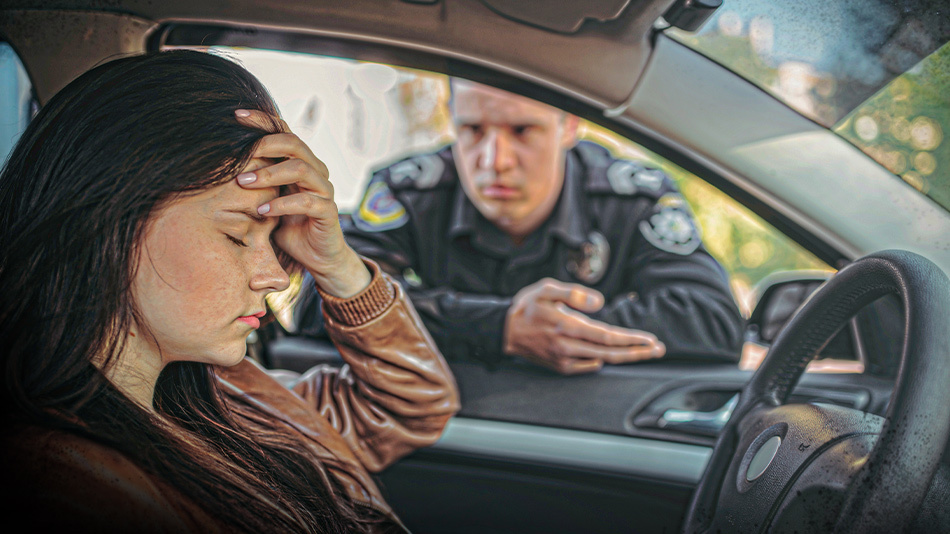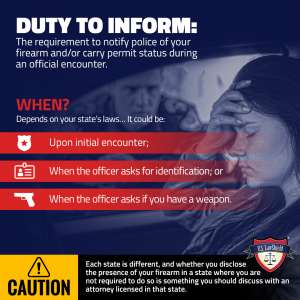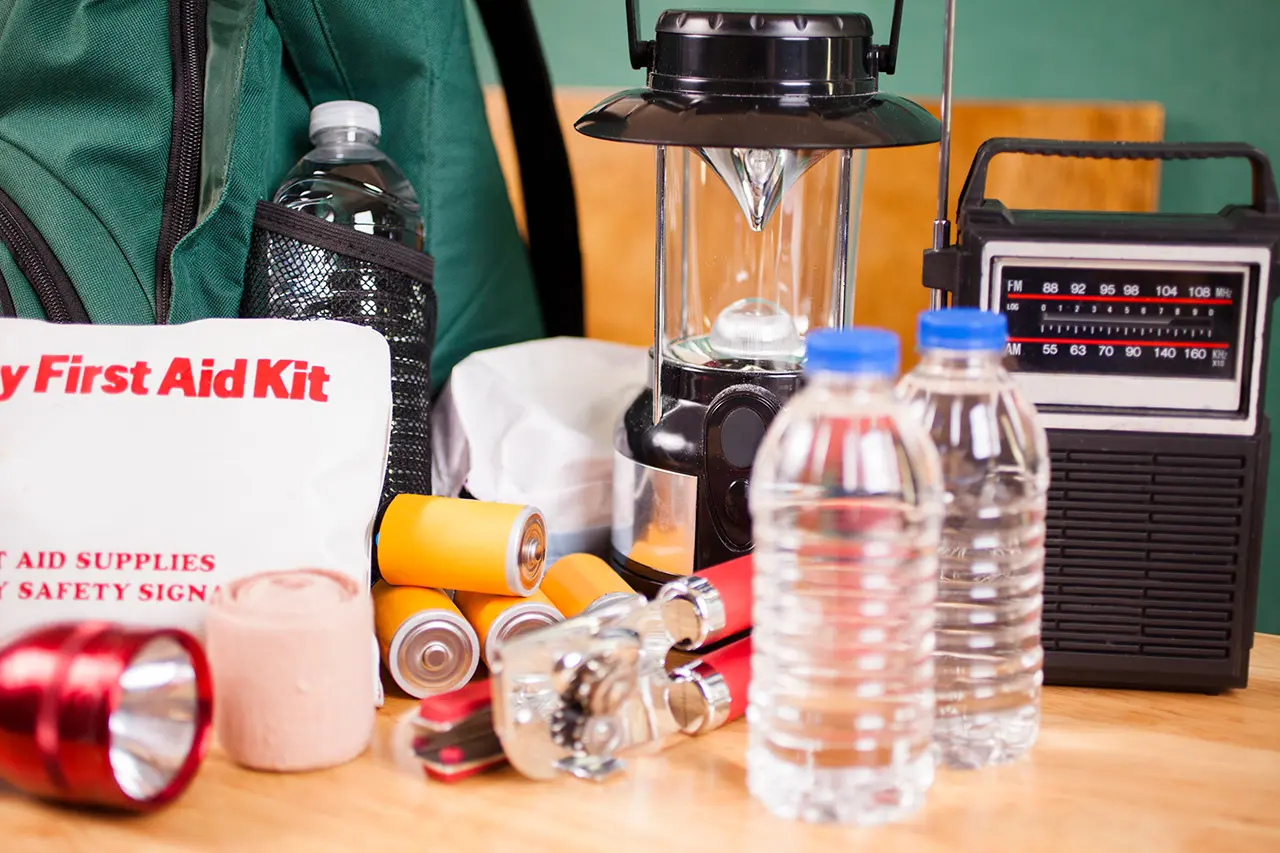
If you have an encounter with law enforcement, do you have to tell them you’re carrying a firearm or that you have a valid license or permit to carry? If there is a legal requirement where you live, failing to do so might mean losing your license or permit, or being charged with a crime. A traffic stop is the wrong time to find out that you have a duty to inform the police of the presence of your openly carried or concealed weapon. In this article, we’ll talk about “duty to inform” laws and how open or concealed firearm carriers need to be prepared to handle law enforcement interactions safely and correctly.
“DUTY TO INFORM”
There are a variety of state and federal laws you need to know. One law that often confuses firearm carriers concerns the “duty to inform.”
A “duty to inform” law generally requires you to notify an officer that you are carrying a firearm and that you have a license or permit to do so when the officer temporarily detains you. Any situation in which you are being asked to produce identification or are being held without the ability to simply walk away may obligate you to explain that you are carrying a firearm and to show your license or permit to carry. Depending on your state’s laws, you might need to declare that you are carrying a firearm at the start of the detention, when the officer asks you for identification, or when the officer asks if you have a weapon. However, law varies widely state to state.
For instance, some states may require a person to volunteer that they are carrying a firearm and present identification and a license or permit to carry without being asked. Other states may not have a statewide mandate concerning a “duty to inform,” but will allow local municipalities to impose a rule. Some states may differentiate between concealed and openly carried handguns in their “duty to inform” laws and have two different requirements. Other states, like Texas, require license holders to declare that they have a firearm and a license to carry when asked by the police officer for “identification.”
In short, always check the law before you carry.

Duty To Inform
CONSTITUTIONAL CARRY COMPLICATIONS
Although the law might be clear for people who have a license or permit to carry a handgun, what about states that allow people to carry handguns without a license or permit to carry?
Constitutional carry, also known as “permitless carry,” is a state law (or set of laws) that generally allows anyone who may legally own a gun to carry without a carry license or permit. “Duty to inform” laws can be vague and may only pertain to people who are carrying under the authority of constitutional carry, so it’s important to know your state’s specific legal language.
For instance, Maine has a “duty to inform” requirement upon first initial contact (meaning, as soon as you are approached by law enforcement) for those carrying without a recognized permit. Texas, on the other hand, has a duty to inform only for license holders (with no penalty for violations), only while they are actively carrying on or about their person (and the duty only begins when the officers ask for your identification). This duty is likely due to legislative oversight, and it is unsettled whether a license holder can have more restrictions than if they were carrying under the authority of constitutional carry. You will likely always be better off getting your LTC.
Nuances like this are not widely known and can create confusion surrounding how to properly obey the law, which is why it is important to know not only your local laws, but also the laws of any state that you have plans to travel to.
If you want to know if constitutional carriers have a “duty to inform” in your state and you’re a member of U.S. LawShield®, reach out to your local Independent Program Attorney. If you’re not a member, maybe it’s time to join up!
CARRYING IN “DUTY TO INFORM” STATES
If you live in a “duty to inform” state, it is important to know the law before you are temporarily detained by an officer. There are a few things that you can do to make sure your law enforcement interactions go smoothly no matter how your state’s “duty to inform” law (if it has one) is written.
Make sure you have your carry license or permit with you. If you only carry your license or permit when you are carrying a gun, it can become easy to forget, which can open you up to legal liability if you carry without it. If you always have your license or permit with you versus only bringing it when you carry a gun, then you are much less likely to forget it.
Each state is different, and whether you disclose the presence of your firearm in a state where you are not required to do so is something you should discuss with an attorney licensed in that state.
Interacting with law enforcement while carrying a firearm can be handled respectfully and safely with a little bit of research and preparation.
The information provided in this publication is intended to provide general information to individuals and is not legal advice. The information included in this publication may not be quoted or referred to in any other publication without the prior written consent of U.S. LawShield, to be given or withheld at our discretion. The information is not a substitute for, and does not replace the advice or representation of a licensed attorney. We strive to ensure the information included in this publication is accurate and current, however, no claim is made to the accuracy of the information and we are not responsible for any consequences that may result from the use of information in this publication. The use of this publication does not create an attorney-client relationship between U.S. LawShield, any independent program attorney, and any individual.





Where allowed (not prohibited), I ALWAYS (any state) carry concealed and keep my Texas LTC right beside my driver’s license. Obviously, in states that do not honor the Texas LTC, I lock up the unloaded pistol and secure it as required for transporting between states. When I’m legally carrying, is there any reason NOT to inform a law enforcement person if I’m pulled over? It hasn’t happened yet, but my plan is to do so.
(The one time in Texas when I was pulled over, I presented my license and LTC together and was polite and respectful. The officer smiled, thanked me, and ignored the “gun” issue while advising me to watch my speed more closely. But yes, that’s Texas for you.)
It would be nice if Law Shield could provide a state-by-state synopsis as to whether or not to inform law enforcement about our license and if we are carrying.
Thanks for the suggestion!
is there a published list of “duty to inform” States?
I believe it is safest to always let a peace officer know you are carying a gun. You do not know the situation that officer might have just left, or their state of mind. You want to avoid surprising an officer with your gun. They want to be able to go home after shift; they will defend themselves as they see fit. This is one way people get shot. You may be legally right, but end up dead right.
Travel guide to gun laws – All 50 states, will answer all or most of your travel questions about that states law.